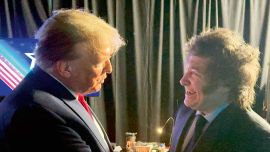Donald Trump thinks with his gut. Teams of scholars who have spent years studying Korean culture, Marxist dialectics, game theory and other presumably relevant subjects disagree about what makes Kim Jong-un tick, but Trump said he would size him up in a couple of seconds and then go on from there. So, after shaking his hand and amiably patting him, he decided the North Korean dictator was a fellow he could do business with. As a man who made his mark dealing with slippery and on occasion thuggish characters in the real estate trade, Trump assumed it would be easy for him to get on friendly terms with Kim, something that no respectable expert on international affairs would dream of trying to do.
Was he right? As expected, most US commentators and their counterparts elsewhere, who with hardly any exceptions despise the unbookish ignoramus Trump and would dearly like to see him come a cropper, quickly came to the conclusion that “the most powerful man on Earth” had been taken for a ride by the wily Oriental and had given away far too much in exchange for nothing more than a few soothing platitudes.
Perhaps he was but, given the circumstances, going out on a limb in an effort to make “rocket-man” stop rattling his nuclear-tipped missiles was surely worth the while. Should that be achieved, Trump would be able get to work on the task he has set himself: ushering North Korea into the modern world.
His negotiating technique is not exactly sophisticated. He believes in a carrot-and-stick approach. To get Kim to Singapore, he threatened his impoverished but nucleararmed little kingdom with “fire and fury like the world has never seen”; to persuade him to change his ways at some time in the not too distant future, he dangled in front of him the prospect of making his domain scandalously rich.
Were Kim an ideologue like his granddad or the clerics running Iran, such an offer would have little effect, but to judge from what is known about the way his mind works, he probably finds Trumpian glitz far more appealing than socialist austerity. He is unabashedly fond of expensive gadgets, enjoyed having a peek at the US president’s hightech armoured limousine and must have been greatly impressed by what he saw in Singapore. From Trump’s point of view, the people who arranged his meeting with Kim could hardly have chosen a better place than that extraordinarily wealthy city state in which the delights of capitalism, along with a fair amount of East Asian discipline, are on full display.
When confronted by the rise of the West, all other societies found themselves split between diehard traditionalists who wanted nothing to do with that they saw as a soulless, materialistic way of doing things and reformers who assumed that unless they learned many Western tricks they would end up getting steamrollered. In East Asia, Japan was the first to choose the latter course; within a few decades, she became strong enough to defeat Russia in a brutal war. Others took their time before following suit, but when they did it turned out very well for them, hence the dawning of what some say will be the “Pacific century.”
The only significant East Asian country that is still holding out is North Korea, whose rulers opted for communism when it was widely believed to hold the key to economic development free from Western meddling.
Could that be about to change? By now Kim, who went to school in Switzerland, must be fed up with ruling a nation of stunted starvelings who chant inane slogans whenever one of the bosses is within earshot. If he wants to go down in history as the man who freed his people from the shackles of a dismal past so they could have a chance of uniting with their southern relatives who live in a prosperous country which even their Chinese neighbours have to take seriously, he could do so by making a deal with the US. The carrot Trump held out may well have him licking his lips.
The downside, and it is a big one, is that to get Kim to take it US negotiators would have to guarantee both him and whatever members of his circle he considers worthy of protection a degree of security that many will quite rightly find outrageous. Unless they get it, they could gang up on him; they know he is a bloodthirsty murderer who uses anti-aircraft guns or, rumour has it, famished dogs to get rid of office-holders whose performance is not up to par.
North Korea’s human rights record is as bad as were Nazi Germany’s or the Soviet Union’s. Torture and summary executions are routine; racial prejudice is incrusted in the system; if a North Korean woman is suspected of having been impregnated by a Chinese or any other foreigner, she is forced to abort to prevent future generations from being contaminated with alien blood.
If anyone deserves to be put before a firing squad or, at the very least, spend the rest of his days in solitary confinement in a dank dungeon, Kim does. But, as Trump has insinuated, insisting on the need for justice to be done come what may would not benefit anyone. On the contrary, it would merely ensure that North Korea remains a bleak prison camp for many years to come. That would certainly not help the people trapped in the hermit kingdom.
The dilemmas the civilised world faces when confronted by individuals like Kim and others who are in a position to blackmail it are unpleasant. There are no simple answers. Demanding unconditional surrender so they can share the fate of Hitler’s worst henchmen is not an option. To get at the tens of thousands of Chinese Communists, their Cuban comrades, Jihadists, the Iranian clerics, Saudis and the rest of them, including the North Koreans, who have committed horrendous crimes of lèse-humanité, the countries in which they are regarded as unpardonable would have to go to war.
As that particular alternative is unthinkable unless national security really happens to be at stake, all Westerners and others who share their values can do is attempt to lure them into the fold by, among other things, promising life-long immunity from prosecution to evildoers such as Kim who have acquired the means to provoke an enormous amount of damage. The only reason Trump has been willing to give him the time of day is his ability to start a nuclear war in which millions of people, most of them Koreans, would die.
























Comments